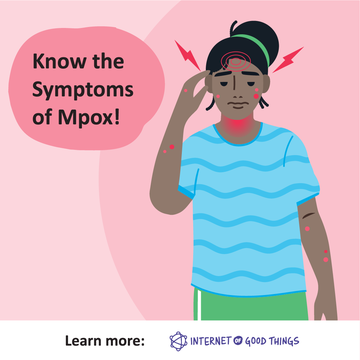1. Know key mpox related information
Mpox is an enveloped virus endemic to Central and West Africa. While the natural reservoir of mpox virus remains unknown, it is thought to be spread by rodents, such as rats, mice, and squirrels.
Incubation period: Signs and symptoms usually begin within a week but can start 1 to 21 days after exposure.
Infectious period: It is considered to be from the onset of symptoms until lesions have scabbed over and fully healed. Symptoms typically last 2 to 4 weeks but may last longer in someone with a weakened immune system.
Common symptoms of mpox include: A rash which may last for 2 to 4 weeks. This may start with, or be followed by fever, sore throat, headache, muscle aches, back pain, low energy, and swollen glands (lymph nodes).
Transmission routes: Close contact with an infected person, including skin-to-skin contact (e.g., touching, sex); mouth-to-mouth or mouth-to-skin contact (e.g., kissing); face-to-face interaction (e.g., talking or breathing close to one another); transmission from mother to baby during pregnancy or birth.
Other transmission routes include contact with contaminated objects (e.g. clothing, linen used by an infected person); needle injuries in healthcare or community settings (e.g., tattoo parlours); animal-to-human transmission through bites, scratches, or handling infected animals (e.g., hunting, skinning, cooking).
Key preventive measures:
- Avoiding physical or prolonged face-to-face contact (handshaking, touching, kissing or sexual contact) with someone who is showing symptoms of mpox. If someone in your family or household has mpox, arrange for them to isolate in a separate room, if possible, personal items should not be shared and seek health care.
- Avoiding contact with surfaces or items used by someone who has mpox.
- Being aware of transmission routes, practicing safe sex (although it doesn’t prevent the skin-to-skin contact), maintaining good personal hygiene and handwashing with soap and water or alcohol-based hand rub.
- Vaccination, particularly recommended for high-risk groups and those in direct contacts with patients.
- Avoid contact with wild animals (alive or dead) known to carry the virus, such as rodents, and those that appear sick or have been found dead.
Please ensure that your plans align with national vaccination plans and priorities.
Average Rating: ☆ ☆ ☆ ☆ ☆ (0 reviews)


